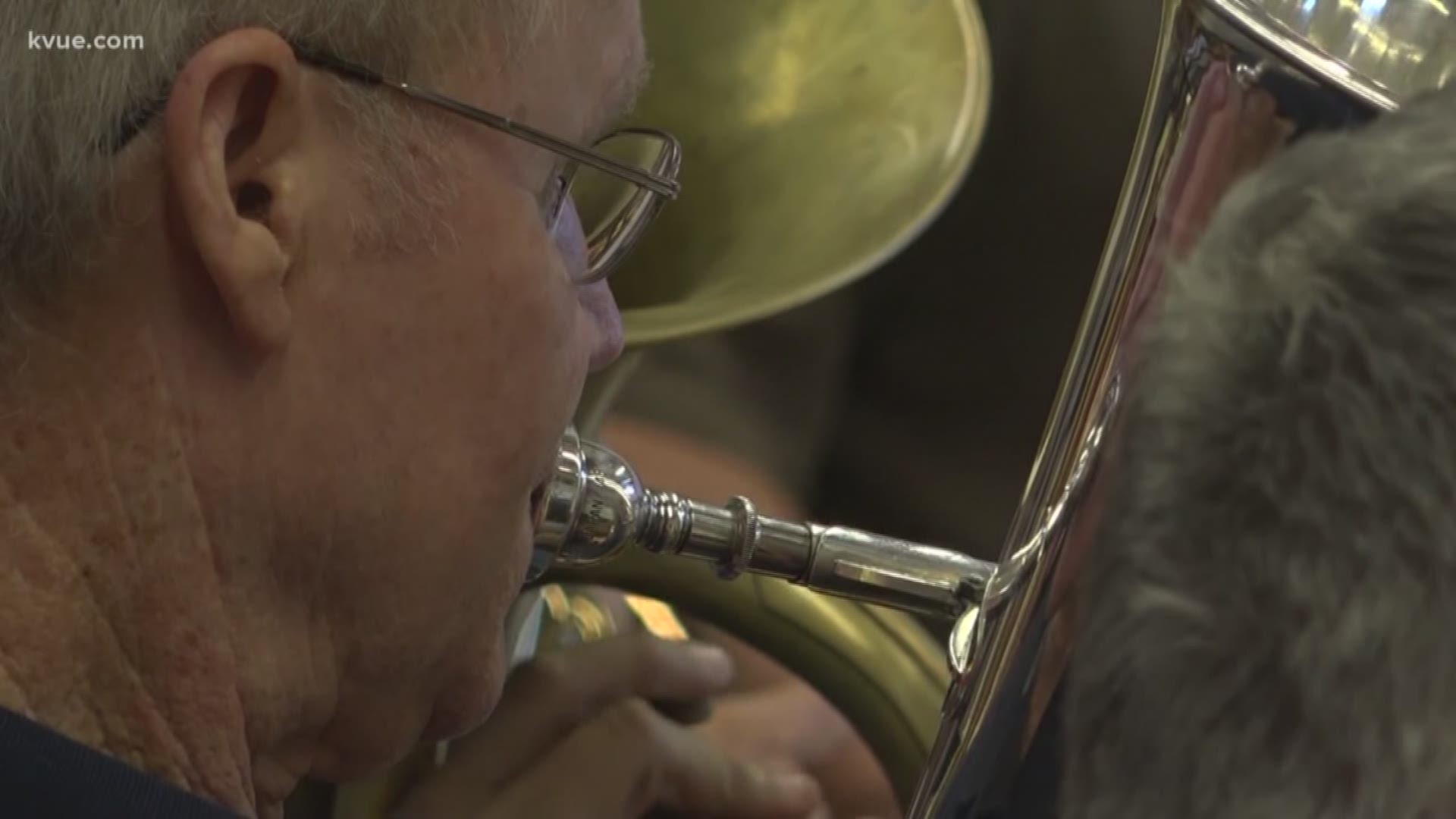AUSTIN — There are few things in life that stretch your mind as much as learning to play music does. Not only are you processing information and memorizing methods but you're also creating art. For one Austin concert band, all of this is even more valuable than they likely realize.
Glenn Richter is someone who grew up around music and ended up becoming the Texas Longhorns Band director from 1980 to 1995. Then in 1998, he was approached by some people in the area asking for his help.
"We started with just four people wanting to learn how to play an instrument," Richter said. "I quickly realized how much people were benefiting from the music experience."
So Richter started adding people to this group and moving them around to whatever building would let them come inside and play music. Early on, he wasn't sure what this group would necessarily become or if it would even last.
"I was a little skeptical, and I had a full time job at the time," Richter said. "We gave it a try and it has just grown so much."
RELATED:
Richter decided to connect his group to the New Horizons International Music Association and create the Austin New Horizons Band. This organization offers people 50 years and older the chance to play in a band with people around the same age. Ken Sandberg is one of the first people to join the band, as someone who started playing the tuba in the seventh grade.
"I thought that I would get to wear a uniform and go to football games," Sandberg said. "I really enjoyed playing the music, so that turned out to be a win-win situation."
Sandberg is turning 93 in July, still going strong and enjoying the chance to continue to make music.
"I don't know if it's the music or the distraction but it is just wonderful and it keeps us coming back every week," Sandberg said. "We go through a rehearsal and by the time we're through, I'm feeling pretty good."
Karol Boes is Sandberg's daughter and someone who didn't grow up playing music. However, her dad had been trying to convince her to play, so she decided to check out the New Horizons Band on her 50th birthday.
"I thought, 'Well, I'll just come play with the band one night,'" Boes said. "Then they introduced me and said I'm a new member of the band. I came the next week and the next week, and I've been coming every Thursday night for nine years now."
Boes ended up deciding to join the woodwinds section as a flute player. She said she loves getting to spend this time with her dad and also see the diversity in musical experience around her.
"Some people are brand new to an instrument," Boes said. "Some are actually band directors themselves. Some are skilled musicians. Some are doctors and in other professions as well."
The reason for this eclectic nature to the group is because of the requirement to be in this band: your age. Other than how old you are, there aren't any restrictions or tryouts in order to join the band.
"Sometimes, you can get stressed at work," Boes said. "I get here, and I feel so much better. I don't know if it's the music or the distraction but it is just wonderful. It keeps us coming back every week. These people are so dedicated.
Boes might not know exactly why it keeps her energized, but Dr. Jack Moncrief thinks he has an idea. Moncrief is a saxophone player in the band and is a nephrologist, meaning he takes care of kidney transplants. Moncrief has been playing the saxophone for about 18 years and said he can tell it has helped keep him mentally fit.
"The medical community has published a number of papers that I have seen that says those people who learn something on a regular basis continue to keep their minds sharp," Moncrief said. "With music, you have to learn it every single time you pick up the instrument and open up a piece of music."
Doctor Bob Duke is the head of music and learning with the Butler School of Music at the University of Texas. He said by helping improve the members' breathing, physical coordination and memory, there is no human activity that engages more of the brain that playing music does.
"It reminds us of the capacity that we have, even as an older adult, to learn things and do things," Duke said. "The brain is very active in refining and stabilizing memories long after our conscious attention has moved on from what we practiced to then something else."
Duke also said the community that is established is important when it is sometimes something that is lost with age.
"It's not just the music making," Duke said. "It's the social part of it that's combined with the music making that makes it so powerful. A lot of human interaction can be built around shared music making experiences."
The first New Horizons Band in the world started in the Eastman School of Music in Rochester, New York. Dr. Roy Ernst had the idea to let senior adults play music in their own group. For the Austin New Horizons Band, it is affiliated with the national organization and also a part of an outreach program with the University of Texas Butler School of Music. There are about 150 bands, orchestras and choruses throughout the United States, Canada and Ireland associated with the New Horizons Band.
To learn more about the Austin New Horizons Band or how you can join the group, you can visit their website here.
Here's part one of KVUE's Music and the Mind series.
Part three of Music and the Mind will air Wednesday morning on KVUE Daybreak.

